Vaccinating your cat is crucial for their overall health and wellbeing. In the Philippines, there are recommended core and non-core vaccinations for cats, according to the Philippine Association of Animal Hospitals. Following the proper vaccine schedule for kittens and adult cats is vital to ensure their protection against various diseases.
Key Takeaways:
- Cat vaccinations are essential for feline health care and disease prevention.
- There are core and non-core vaccines recommended for cats in the Philippines.
- Following a vaccine schedule is crucial to provide adequate protection.
- Vaccinations boost the immune system and prevent the spread of diseases.
- Consulting with a veterinarian is important for proper vaccination planning.
Cat Vaccinations Schedule for Kittens
Ensuring the health and well-being of your kitten starts with following a proper cat vaccination schedule. Vaccinations are essential to protect kittens from common diseases and set them up for a healthy life. Understanding the recommended vaccination age and the types of vaccines available is crucial for responsible pet ownership.
When it comes to kittens, it is important to bring them to the veterinarian for a check-up and fecal examination at 4 weeks old. However, vaccinations are not administered at this young age. The first vaccination, usually the Feline Distemper Vaccine, can be given at 9 weeks old.
Following the recommended vaccination schedule for kittens is crucial to ensure proper protection against diseases. Different vaccines are categorized as either core or non-core vaccines. Core vaccines are essential and should be administered to all kittens regardless of their lifestyle. On the other hand, non-core vaccines are optional and depend on your kitten’s risk factors.
Core Vaccines for Kittens
The core vaccines for kittens include:
- Feline Distemper Vaccine: Protects against feline panleukopenia virus (FPV), which is a highly contagious virus that affects the gastrointestinal tract and can be fatal for kittens.
- Feline Herpesvirus-1 Vaccine: Guards against feline viral rhinotracheitis (FVR), a viral respiratory infection.
- Feline Calicivirus Vaccine: Provides protection against feline calicivirus (FCV), another common respiratory infection that can cause ulcers in the mouth and respiratory symptoms.
These core vaccines are crucial for protecting kittens against severe diseases that can significantly impact their health and quality of life. By following the recommended vaccination schedule, you can ensure that your kitten receives the necessary protection.
Non-Core Vaccines for Kittens
Non-core vaccines, although optional, may be recommended based on your kitten’s lifestyle and potential exposure to certain diseases. These vaccines include:
- Rabies Vaccine: Protects against rabies, a deadly viral disease that can be transmitted to humans.
- Chlamydophila Vaccine: Prevents upper respiratory tract diseases caused by the bacterium Chlamydophila felis.
- Feline Leukemia Virus (FeLV) Vaccine: Recommended for kittens with potential exposure to FeLV, a viral infection that weakens the immune system and can lead to various health issues.
Discuss with your veterinarian which non-core vaccines are suitable for your kitten based on their lifestyle, environment, and risk factors. Your veterinarian will provide guidance on the most appropriate vaccination schedule to ensure optimal protection.
| Vaccine | Administration Age |
|---|---|
| Feline Distemper Vaccine | 9 weeks |
| Feline Herpesvirus-1 Vaccine | 9 weeks |
| Feline Calicivirus Vaccine | 9 weeks |
| Rabies Vaccine | 12-16 weeks (or as required by local regulations) |
| Chlamydophila Vaccine | As recommended by the veterinarian |
| Feline Leukemia Virus (FeLV) Vaccine | As recommended by the veterinarian |
Remember, proper vaccination is a crucial part of responsible pet ownership. By following the cat vaccination schedule and consulting with your veterinarian, you can ensure the well-being and health of your adorable kitten.
Types of Cat Vaccines
When it comes to protecting your feline companion, there are various types of vaccines available in the Philippines. Each vaccine targets specific diseases and provides essential immunization for cats. Understanding these vaccines is crucial for ensuring the health and wellbeing of your furry friend.
Tricat Vaccine
The tricat vaccine is a live vaccine that offers protection against three highly contagious diseases: feline panleukopenia virus, feline calicivirus, and feline herpesvirus. This vaccine is crucial for preventing these diseases, which can cause severe illness and even be life-threatening for cats.
Tetracat Vaccine
The tetracat vaccine is designed to safeguard cats against multiple diseases. It provides protection against chlamydia, feline rhinotracheitis, feline panleukopenia, and feline calicivirus. By administering the tetracat vaccine to your cat, you can help prevent these common feline diseases.
Rabies Vaccine
Rabies is a deadly viral infection that can be transmitted to humans through bites or scratches from infected animals. Vaccinating your cat with the rabies vaccine is not only vital for their protection but also plays a crucial role in preventing the spread of rabies to humans and other animals.
Vaccines for Specific Diseases
In addition to the tricat, tetracat, and rabies vaccines, there are other vaccines available to address specific diseases. For example, the chlamydophila vaccine offers protection against respiratory tract diseases, while the feline immunodeficiency virus (FIV) vaccine is recommended for cats at risk of exposure to FIV.
It is important to consult with your veterinarian to determine the appropriate vaccinations for your cat based on their lifestyle, potential exposure to diseases, and overall health. Vaccinating your cat with the right vaccines will help ensure their long-term health and protection against preventable diseases.
Importance of Cat Vaccinations
Cat vaccinations play a crucial role in protecting cats from various diseases. By ensuring that your cat receives the necessary vaccines, you can provide them with a strong immune system and safeguard their health and well-being. Vaccines offer numerous benefits, including:
- Protection against diseases: Vaccines help to shield cats from a wide range of illnesses, such as viral infections, respiratory diseases, and more. They stimulate the cat’s immune system, equipping it to fight off harmful pathogens effectively.
- Prevention of disease spread: Vaccinated cats have a lower risk of contracting and transmitting diseases to other cats, reducing the overall prevalence of these illnesses within feline communities.
- Ensuring feline health care: Regular vaccination is an essential component of feline health care. It forms a foundation for preventing serious, potentially life-threatening diseases and maintaining the overall well-being of your cat.
Vaccinating your cat not only safeguards their health and longevity but also plays a significant role in promoting public health by preventing the spread of zoonotic diseases from cats to humans. It is important to consult with a veterinarian to determine the appropriate vaccination schedule and ensure that your cat receives the necessary vaccines for optimal protection.
| Vaccine | Benefits |
|---|---|
| Tricat vaccine | Protects against feline panleukopenia virus, feline calicivirus, and feline herpesvirus |
| Tetracat vaccine | Prevents chlamydia, feline rhinotracheitis, feline panleukopenia, and feline calicivirus |
| Rabies vaccine | Essential for preventing rabies, a deadly viral disease |
| Additional vaccines | Target specific diseases like chlamydophila and feline immunodeficiency virus (FIV) |
Vaccination Preparation and Aftercare
Before vaccinating your cat, it is important to schedule an appointment with a veterinarian. This ensures that your cat receives the necessary vaccines and proper care. During the vet visit, provide all relevant information about your cat’s health and any previous vaccinations. This will help the veterinarian determine the appropriate vaccines and dosage.
Once at the veterinarian’s office, your cat will receive a thorough check-up to ensure they are healthy enough for vaccination. This includes assessing their overall well-being and checking for any signs of illness or underlying conditions.
After vaccination, it is crucial to provide your cat with post-vaccination care. Create a comfortable and relaxing space for your cat to rest and recover. Ideally, this area should be quiet and free from any stressors. Offer your cat food and water to keep them hydrated and nourished.
Monitor your cat closely for any unusual symptoms or behaviors following vaccination. Some cats may experience mild side effects, such as lethargy or slight swelling at the injection site, which typically subside within a day or two. However, if you notice any severe or persistent symptoms, contact your veterinarian immediately for guidance.
Remember, each cat may react differently to vaccinations, so it’s crucial to provide individualized care and attention. By following these steps, you can ensure a smooth vaccination process and help maintain your cat’s overall well-being.
Core Vaccines for Kittens
Core vaccines are crucial for ensuring the health and well-being of kittens. These vaccines protect against common diseases that can have severe consequences for feline health. Let’s take a closer look at the core vaccines recommended for kittens:
Cat Flu
Cat flu is caused by feline herpesvirus and feline calicivirus. It is highly contagious and can lead to symptoms such as sneezing, nasal discharge, and conjunctivitis. Kittens are particularly vulnerable to cat flu, and vaccination provides them with vital immunity against this respiratory disease.
Feline Panleukopenia Virus
Feline panleukopenia virus, also known as feline distemper, is a highly contagious infection that primarily affects the gastrointestinal system. It can cause severe diarrhea, vomiting, and dehydration in kittens, leading to life-threatening complications. Vaccination is essential to protect against this potentially fatal disease.
Feline Leukaemia Virus
Feline leukaemia virus weakens the immune system and makes kittens more susceptible to other infections and diseases. It can lead to various health issues, including anemia, weight loss, and immune-mediated diseases. Vaccination against feline leukaemia virus is crucial to safeguard the overall health and longevity of kittens.
By ensuring that kittens receive their core vaccinations, pet owners can provide them with the best possible protection against cat flu, feline panleukopenia virus, and feline leukaemia virus. Consult with a veterinarian to determine the appropriate vaccination schedule and keep your furry friend safe and healthy.
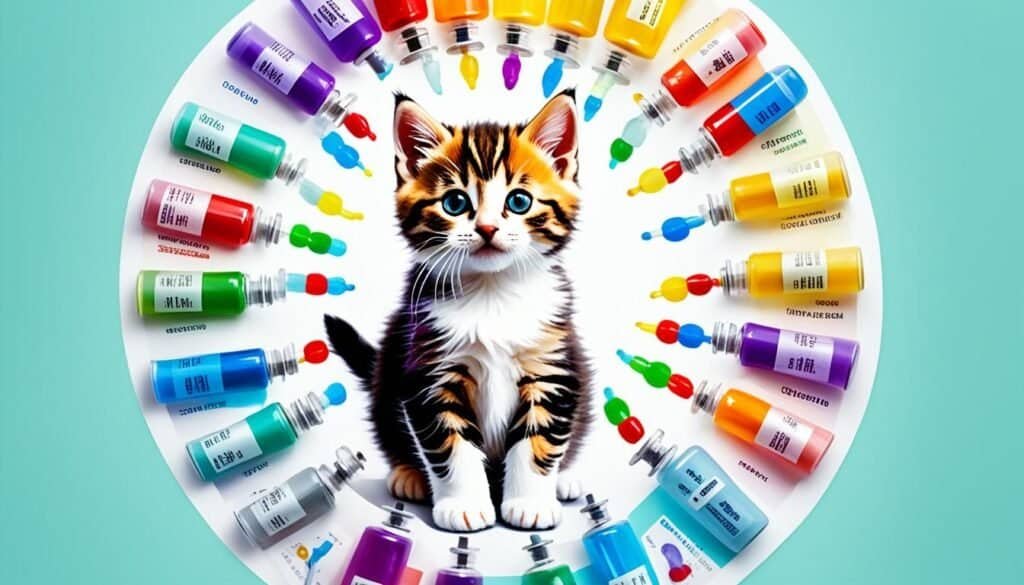
| Vaccine | Protection Against |
|---|---|
| Cat Flu | Feline herpesvirus and feline calicivirus |
| Feline Panleukopenia Virus | Severe gastrointestinal infection |
| Feline Leukaemia Virus | Immune system weakening and susceptibility to other diseases |
Vaccination Timing for Kittens
Timing of kitten vaccinations plays a crucial role in ensuring their overall health and protection against diseases. It is important to follow the recommended schedule to provide kittens with the necessary immunity at the right age.
The ideal age for a kitten’s first vaccination is around 8 weeks old. This is when their immune system is developed enough to respond to the vaccines effectively. It is recommended to take your kitten to a veterinarian for their first vaccination at this age.
After the initial vaccination, a second injection is typically administered between 3 to 5 weeks later. This helps to strengthen and prolong their immunity, providing additional protection against diseases.
Consulting with a veterinarian is crucial to determine the best timing for your kitten’s vaccinations. Each kitten may have unique needs and circumstances that should be considered for their vaccination plan.
Ensure to follow the vaccination schedule recommended by your veterinarian and keep track of your kitten’s immunization records for future reference.
By vaccinating your kitten at the appropriate age, you can ensure their optimal health and protection against common diseases.
Booster Vaccinations for Kittens
After the initial vaccinations, kittens require booster shots to maintain their immunity. These booster vaccinations are crucial for ensuring continued protection against diseases throughout their lives.
Typically, booster vaccinations for cat flu, feline panleukopenia, and feline leukaemia are given between 12 and 16 weeks of age. These boosters help strengthen their immune response to these diseases, providing enhanced protection.
Once the kitten reaches one year old, annual boosters may be recommended by the veterinarian. These annual boosters help to maintain their immunity and ensure continued protection against potential infections or outbreaks.
Annual boosters for cats are important as they help reinforce the immune response and protect against any potential gaps in their immunity. Regular boosters also give veterinarians an opportunity to assess your cat’s overall health and address any emerging issues proactively.
Benefits of Booster Vaccinations
Booster vaccinations for kittens and cats offer several benefits:
- Enhanced protection against common feline diseases
- Stronger immune response to infections
- Prevention of disease outbreaks
- Early detection of underlying health issues during annual vet check-ups
Incorporating booster vaccinations into your kitten’s healthcare routine ensures their long-term well-being and minimizes the risk of infectious diseases.
Vaccination Schedule for Boosters
The exact timing of booster vaccinations may vary based on your kitten’s previous vaccines, specific healthcare needs, and any potential exposure risks. However, the typical schedule for booster vaccinations is as follows:
| Vaccine Type | Age | Frequency |
|---|---|---|
| Booster Vaccination for Cat Flu | 12-16 weeks | Annual |
| Booster Vaccination for Feline Panleukopenia | 12-16 weeks | Annual |
| Booster Vaccination for Feline Leukaemia | 12-16 weeks | Annual |
Consult with your veterinarian to create a personalized vaccination schedule for your kitten, taking into account their specific needs and risk factors.
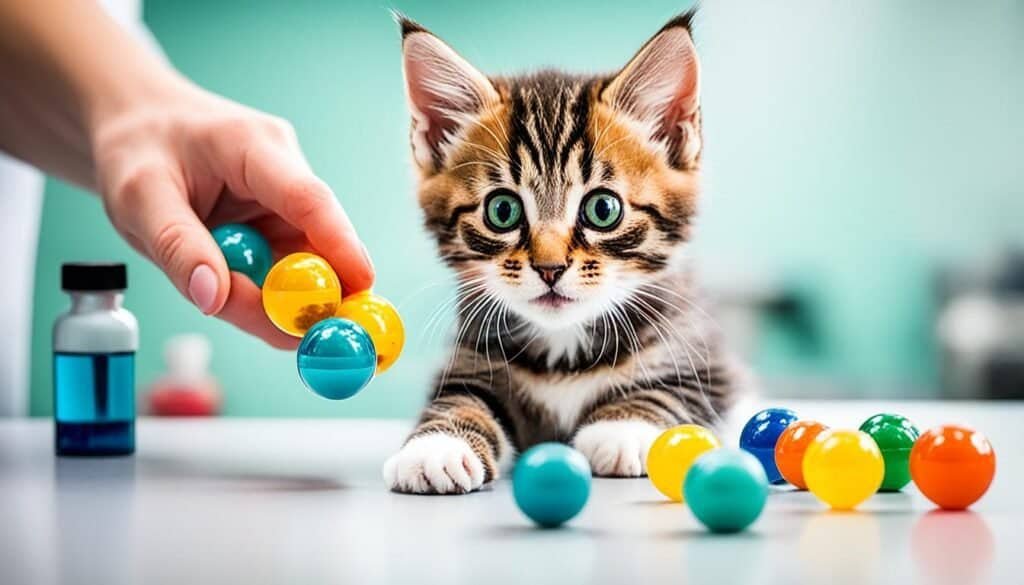
Annual boosters are an essential part of maintaining your cat’s overall health and well-being. By staying up-to-date with their vaccinations, you can help ensure a long and happy life for your feline companion.
Other Vaccines to Consider
In addition to core vaccines, there are other vaccines that you may need to consider for your cat, depending on their lifestyle and potential exposure to specific diseases. Consulting with your veterinarian is crucial in determining the necessity and importance of these additional vaccines.
The Chlamydophila Vaccine
The Chlamydophila vaccine can help prevent conjunctivitis and upper respiratory tract diseases in cats. This vaccine is particularly important if your cat has a higher risk of exposure to other infected cats, such as in multi-cat households or catteries.
The FIV Vaccine
The FIV (Feline Immunodeficiency Virus) vaccine provides protection against the virus that causes feline immunodeficiency in cats. It is recommended for cats that go outdoors, have a higher chance of fighting or mating with other cats, or live in areas where FIV is more prevalent.
The Rabies Vaccine
In some cases, the rabies vaccine may be mandatory for travel or depending on local regulations. Even if not required, it is highly recommended to vaccinate your cat against rabies to ensure their safety and prevent the transmission of this fatal disease.
By discussing these additional vaccines with your veterinarian, you can make informed decisions about your cat’s health and provide them with the best possible protection against various diseases.
| Vaccine | Description |
|---|---|
| Chlamydophila Vaccine | Prevents conjunctivitis and upper respiratory tract diseases |
| FIV Vaccine | Protects against feline immunodeficiency virus |
| Rabies Vaccine | Prevents rabies, a fatal disease |
Vaccinations for Outdoor Cats
Outdoor cats are more susceptible to diseases due to their interactions with other animals. To protect their health, it is crucial to ensure that outdoor cats receive all necessary vaccinations. Vaccinations for outdoor cats play a vital role in preventing diseases contracted from injuries and bites. By vaccinating your outdoor cat, you can provide them with the necessary immunity to stay healthy and active.
There are additional vaccines that may be recommended for outdoor cats, such as those for feline immunodeficiency virus (FIV). FIV is a contagious disease that weakens the immune system of cats, making them more vulnerable to other infections. Vaccinating your outdoor cat against FIV can help reduce the risk of infection and improve their overall well-being.
Consulting with a veterinarian is essential to determine the appropriate vaccination plan for your outdoor cat. They will assess your cat’s health, lifestyle, and potential exposure to diseases, guiding you in making informed decisions about their vaccinations.
By prioritizing vaccinations for your outdoor cat, you can ensure their safety and prevent the spread of diseases within the feline community. Take the proactive step of vaccinating your outdoor cat to provide them with the best protection against injuries, bites, and associated diseases.
Conclusion
Cat vaccinations are vital for safeguarding the health of your beloved feline companion and preventing the transmission of diseases. These vaccines provide essential immunity against various viruses and infections, ensuring a longer and healthier life for your cat.
To ensure maximum protection, it is crucial to adhere to a proper vaccination schedule recommended by a qualified veterinarian. They will assess your cat’s specific needs and advise on the most suitable vaccination plan. Regular vaccinations can help bolster your cat’s immune system and prevent the spread of harmful diseases.
By prioritizing your cat’s vaccinations, you are taking proactive measures to safeguard their overall well-being. Remember, prevention is always better than cure, and vaccination is a key component of responsible pet ownership. Give your cat the gift of good health by prioritizing their vaccinations and providing them with the necessary protection they need.
FAQ
Why are cat vaccinations important?
What is the vaccination schedule for kittens?
What types of cat vaccines are available?
What are the benefits of cat vaccinations?
How should I prepare for my cat’s vaccination?
What are the core vaccines for kittens?
When should kittens receive their first vaccination?
Do kittens require booster vaccinations?
Are there other vaccines to consider for cats?
What vaccinations are recommended for outdoor cats?
Why should I vaccinate my cat?
Last modified: February 20, 2024

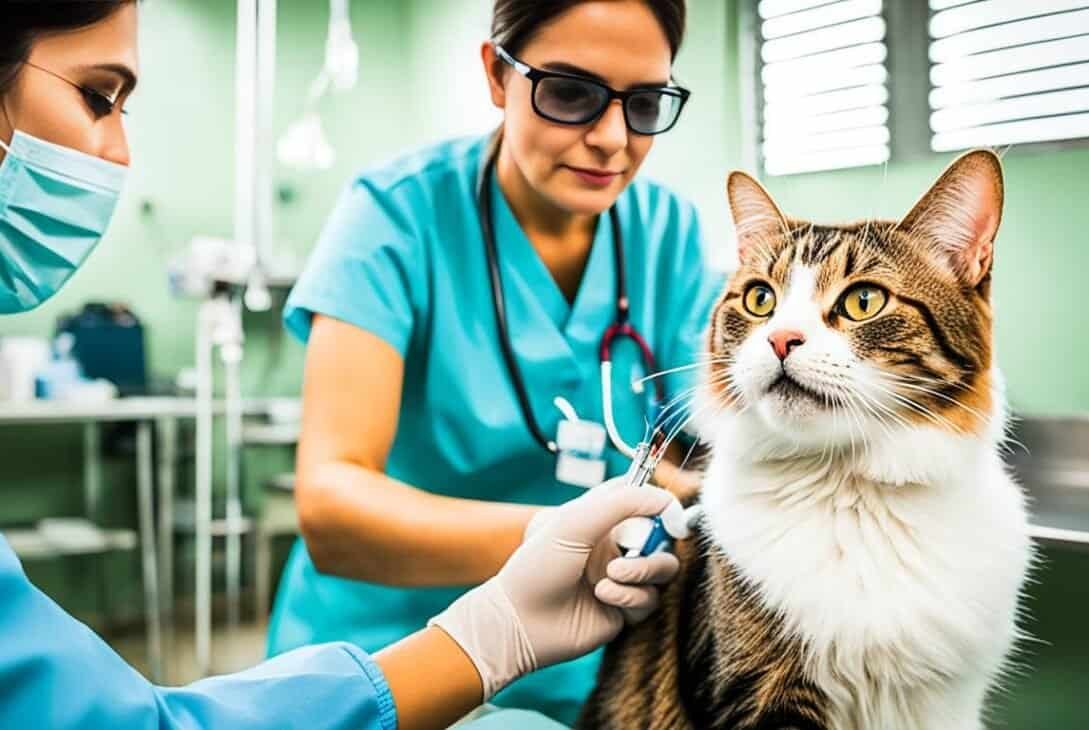
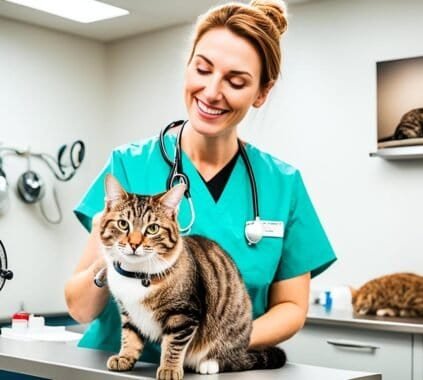
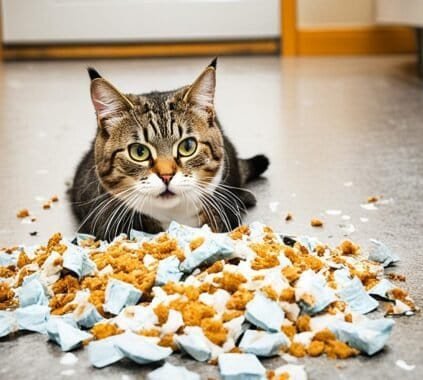
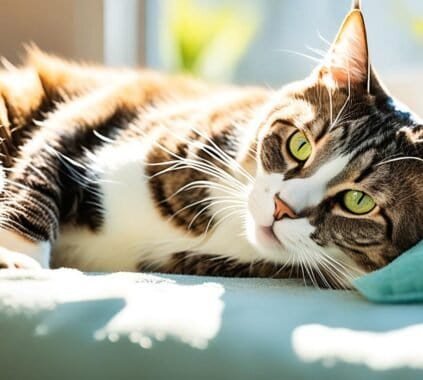
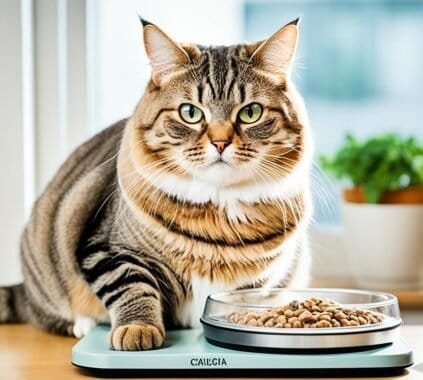








[…] it’s essential to have a calm and steady approach when dealing with bleeding in cats. By following these steps and seeking prompt veterinary care, you can help ensure the best possible […]
[…] your cat’s age and life stage is essential in providing appropriate care and veterinary checkups. There are several methods to estimate your […]
[…] for a balanced diet. This article will provide valuable tips on cat nutrition, including the essential nutrients cats need, balanced meal plans, weight management, feeding guidelines, digestive health, and selecting […]
[…] your cat vaccinated against rabies. Vaccination is the most effective way to prevent the […]
[…] and neutering are essential procedures that offer numerous benefits for cats, their owners, and the community. By preventing unwanted litters, these procedures play a crucial […]
[…] a comprehensive physical examination, assess your cat’s overall health, and administer essential vaccinations to protect against common cat […]
[…] it comes to keeping our feline friends healthy, cat vaccinations play a crucial role. Vaccinations are an essential preventive measure against life-threatening […]
[…] a healthy weight is crucial for their overall well-being. In this article, we will provide you with essential tips and guidance on how to manage your cat’s weight effectively and […]
[…] Cat nutritional needs include a wide range of essential nutrients, such as vitamins, minerals, fatty acids, and amino acids. These nutrients are crucial for various bodily functions, including maintaining a healthy immune system, promoting strong bones and teeth, and supporting optimal growth and development. […]
[…] a responsible cat owner, it’s essential to be aware of the signs of dental disease in cats. Some common signs to look out for include bad breath, bleeding gums, gum recession, drooling, and […]
[…] parasite control, routine wellness exams also play a crucial role in vaccinations. These vaccinations protect cats against common and potentially life-threatening diseases, such as feline distemper (panleukopenia), […]